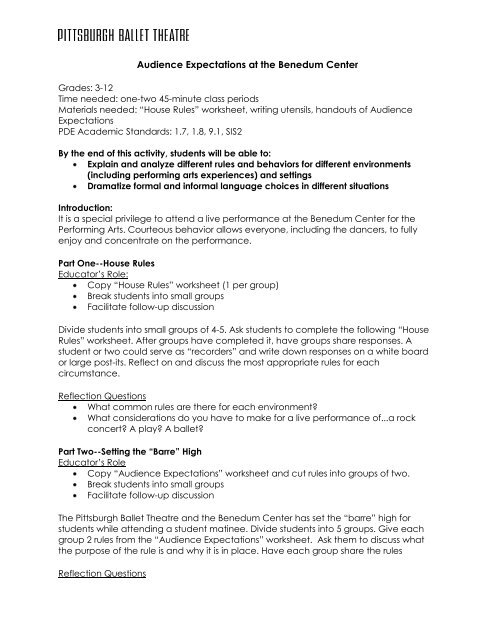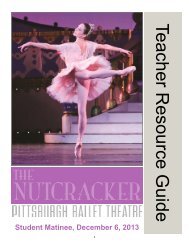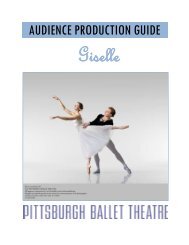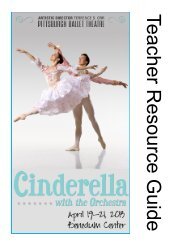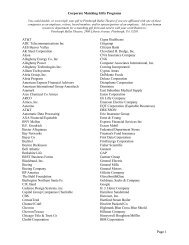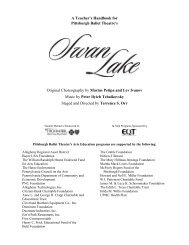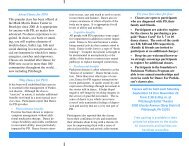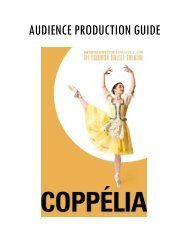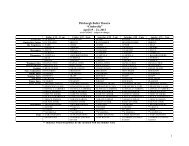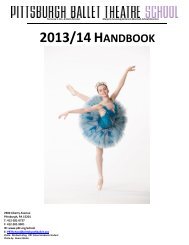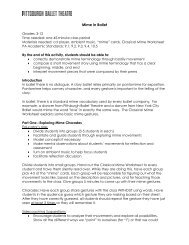Audience Expectations - Pittsburgh Ballet Theatre
Audience Expectations - Pittsburgh Ballet Theatre
Audience Expectations - Pittsburgh Ballet Theatre
You also want an ePaper? Increase the reach of your titles
YUMPU automatically turns print PDFs into web optimized ePapers that Google loves.
<strong>Audience</strong> <strong>Expectations</strong> at the Benedum CenterGrades: 3-12Time needed: one-two 45-minute class periodsMaterials needed: “House Rules” worksheet, writing utensils, handouts of <strong>Audience</strong><strong>Expectations</strong>PDE Academic Standards: 1.7, 1.8, 9.1, SIS2By the end of this activity, students will be able to:Explain and analyze different rules and behaviors for different environments(including performing arts experiences) and settingsDramatize formal and informal language choices in different situationsIntroduction:It is a special privilege to attend a live performance at the Benedum Center for thePerforming Arts. Courteous behavior allows everyone, including the dancers, to fullyenjoy and concentrate on the performance.Part One--House RulesEducator’s Role:Copy “House Rules” worksheet (1 per group)Break students into small groupsFacilitate follow-up discussionDivide students into small groups of 4-5. Ask students to complete the following “HouseRules” worksheet. After groups have completed it, have groups share responses. Astudent or two could serve as “recorders” and write down responses on a white boardor large post-its. Reflect on and discuss the most appropriate rules for eachcircumstance.Reflection QuestionsWhat common rules are there for each environment?What considerations do you have to make for a live performance of...a rockconcert? A play? A ballet?Part Two--Setting the “Barre” HighEducator’s RoleCopy “<strong>Audience</strong> <strong>Expectations</strong>” worksheet and cut rules into groups of two.Break students into small groupsFacilitate follow-up discussionThe <strong>Pittsburgh</strong> <strong>Ballet</strong> <strong>Theatre</strong> and the Benedum Center has set the “barre” high forstudents while attending a student matinee. Divide students into 5 groups. Give eachgroup 2 rules from the “<strong>Audience</strong> <strong>Expectations</strong>” worksheet. Ask them to discuss whatthe purpose of the rule is and why it is in place. Have each group share the rulesReflection Questions
What will happen if you do not follow audience expectations? Think about notonly school policies but the Benedum Center Policies.What rules do you think are missing from this list and why would they beimportant?What rules on the list do you think are not important and why?Part Three--Say it with Grace!Educator’s RoleModel concept of “rude” versus “polite” language and behavior for studentsBreak students into partners, if necessaryFacilitate follow-up discussion.While you are most definitely responsible for your own behavior while at the BenedumCenter, you can also help your peers remember the audience expectations, too.Sometimes figuring out how to address your peers in these situations can be difficult.Just remember--say it with grace!Discuss the differences between “polite and tactful” words and behavior and “rudeand impertinent” words and phrases. Brainstorm “polite” and “rude” words withstudents. For an extra challenge, brainstorm body postures and gestures associatedwith “polite” and “rude” behavior.Model for students the concept using a rule from your classroom (i.e., speaking out ofturn). Ask for a student volunteer to pretend to “break” the rule. Then, model a “rude”way of addressing the problem (i.e., “Shut up! You know you’re not supposed to betalking right now!) Ask the student volunteer how it made them feel to be addressedthat way. Next, ask students to generate some more “polite and tactful” ways ofaddressing the problem.Break students into pairs. Give each pair one of the audience expectations todramatize the “wrong” and “right” way to address behavioral problems.AssessmentDiscussionStudent behavior while at the PBT student matinee, both of themselves andmanaging each other’s behavior
House RulesEvery environment that you are in has different rules andexpectations for how you should behave in it. Think about therules you have encountered in each of the followingenvironments. As a group, discuss and record what you think arethe 5 most important rules for each environment.Rules at your homeRules in your classroomRules at a movie theatreRules at a swimming poolRules at a funeralRules at the balletGroup members’ names: _____________________________________________________________________________________________________________________
<strong>Audience</strong> <strong>Expectations</strong> at the Benedum Center1. Once inside the Benedum Center you will not be permitted to leave and re-enter thebuilding.2. Be sure to sit in the section assigned to your school. An usher will be happy to helpyou find where your school's seats are located.3. Talking to your neighbor in a normal speaking voice is fine prior to the performanceand during intermissions. Remember, the performance begins with the orchestralOverture and during the performance; even the softest whisper can be distracting tothose nearby. PLEASE DO NOT TALK DURING THE PERFORMANCE.4. There may be one or two intermissions during the performance. This allows thedancers time to rest or make elaborate costume changes, the production staff time tomake major set changes and students time to stretch their legs and use the rest rooms.5. The taking of pictures is prohibited during a performance, so it is best to leave yourcameras at home.6. Applause is the best way to communicate with the dancers. It tells them that you areenjoying the performance. However, excessive applauding and cheering can beequally as distracting to your fellow audience members. Bottom line: if you seesomething you really like, feel free to applaud!7. Remain with your class. The Benedum Center is very large, and it is easy to get lost.8. Chewing gum, food and drink are not acceptable in the theater.9. Cell phones should be turned completely off during the performance. No textmessaging is allowed during the performance.10. Educators and Chaperones: You are expected to remain with your group at all timesand address any behavioral issues as they arise. If you notice behavioral issues withanother group at the theatre, please do not hesitate to contact an usher who willhandle the problem as quickly and efficiently as possible.Students and educators who choose not to adhere to audience expectations may beasked to do the following by ushers or PBT staff:turn off cell phonesmove to a single seat away from distractions of nearby audience membersexit the theatre and remain in the lobby during the duration of the performance


